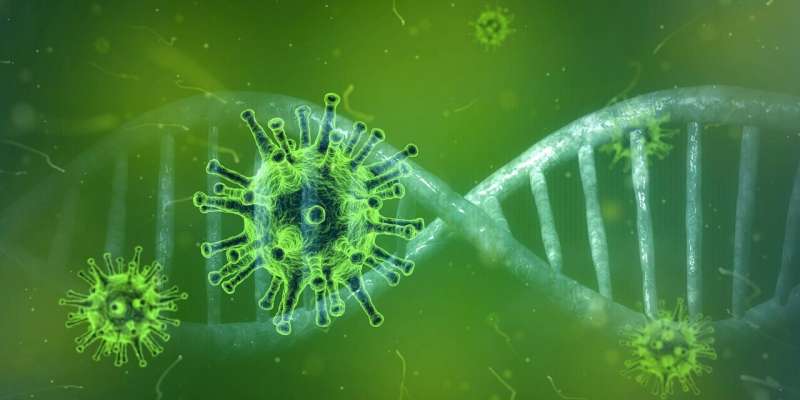COVID-19 causes chaos in infected cells’ RNA, finds study

Coronavirus disease (COVID-19) hijacks parts of infected cells’ vital RNA machinery, thereby blocking important functions in the cells. These damaging changes in the RNA can likely be reversed, potentially leading to new drugs against COVID-19, University of Gothenburg researchers show.
Genetic material in the body’s cells consists of DNA, which serves as long-term storage of genetic information. RNA carries this encoded information to the cells for transcription and translation. These processes enable them to make proteins, which perform most intracellular tasks. The cells’ RNA is modifiable to allow correct transfer of the DNA information to the proteins. In recent years, scientific understanding of the complexity and importance of these RNA modifications has grown.
Drastic impact
It has been shown that RNA modifications take place in various viruses, but exactly how the viruses affect the RNA modification processes when they infect cells is unknown. This study reports that SARS-CoV-2 infection disrupts the RNA modifications, and the extent of these RNA modification changes surprised the researchers.
One of the modifications affected by SARS-CoV-2, known as m6A (a multifaceted regulator of gene expression), is highly important for RNA’s basic functions, including transportation of data to the protein-making parts of the cell, and transcription and translation into amino acids there.
“We were surprised at the extent and drastic scale of m6A RNA modification loss in SARS-CoV-2 infection. We also found that the coronavirus variants have differing effects on m6A levels,” says Tanmoy Mondal, researcher at Sahlgrenska Academy, University of Gothenburg, who led the project.
Potential drug target
The m6A modification is regulated partly by the enzyme METTL3 (the m6A methyltransferase). The study shows that the localization of this enzyme is affected by the infection; that blocking nuclear export proteins in the cell can restore METTL3 to its original localization while corona infection is ongoing; and that this may serve to arrest the progression of the virus. It might then be possible to develop the blocking effect in a new drug against COVID-19.
The study results may provide new clues to why some people have chronic symptoms that persist long after COVID (“Post-COVID Conditions” or “Long COVID”). The infection appears to leave lasting traces in host cells by removing the m6A modification, which can cause persistent COVID-like symptoms, the scientists note.
They conducted their research using various established research models available for studying SARS-CoV-2 infection. Since the studies were implemented in a controlled laboratory environment, more research is required to show how the virus interacts with human cells in real-life situations.
The research was carried out in collaboration with scientists in France and South Korea. The results of the study are now published in the journal Genome Research.
More information:
Roshan Vaid et al, Global loss of cellular m6A RNA methylation following infection with different SARS-CoV-2 variants, Genome Research (2023). DOI: 10.1101/gr.276407.121
Citation:
COVID-19 causes chaos in infected cells’ RNA, finds study (2023, March 29)
retrieved 29 March 2023
from https://phys.org/news/2023-03-covid-chaos-infected-cells-rna.html
This document is subject to copyright. Apart from any fair dealing for the purpose of private study or research, no
part may be reproduced without the written permission. The content is provided for information purposes only.
For all the latest Science News Click Here
For the latest news and updates, follow us on Google News.

